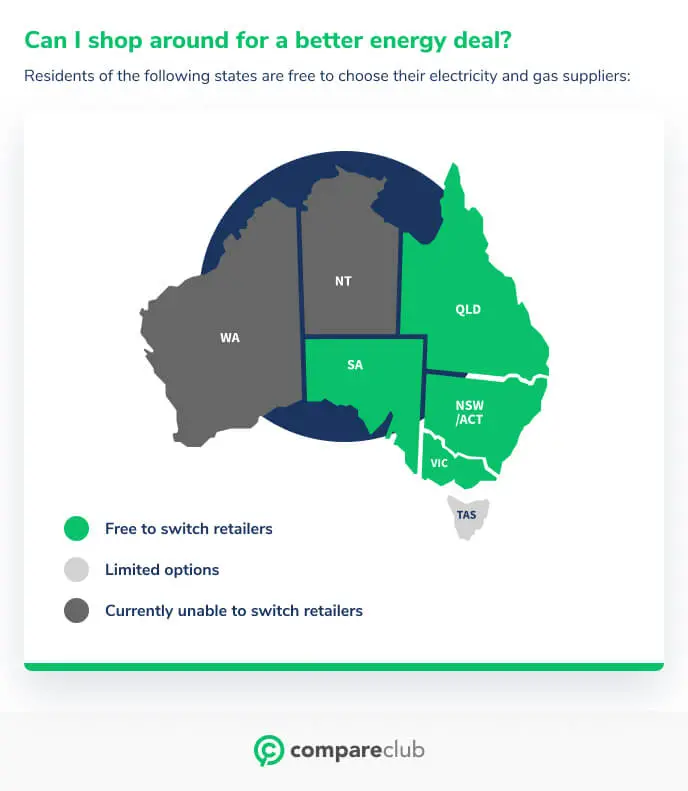quote
Connecting Utilities When Moving House
When you move house, you’ll likely need to go about reconnecting electricity after disconnection by the previous owner.
That might include organising a new energy, gas, or solar plan – or all three.
It’s a great opportunity to switch to a new energy provider to find a cheaper option for your energy needs.
The experts at Compare Club will find you the lowest possible price and take care of all the paperwork for you.
Moving house gas & electricity: What you can compare
You could be paying more than you need to for your energy or gas. Our current plans are between $266 and $553 less than the energy reference price. Savings are calculated compared to the Energy Reference price for a single- rate energy meter based on Compare Club’s best offer as of 25th July 2024. Connecting electricity and gas to your new home is the perfect time to cash in on those savings.
Moving house electricity: Why compare?
The experts at Compare Club make it fast, simple, and easy to compare energy, gas, and solar plans. We’ll find you the lowest possible price, apply any relevant discounts, and even take care of all the paperwork for you. Our experts compare the big brands and boutique energy providers, and we’re free to use with no hidden fees. However, keep in mind that your current energy provider might apply a fee for disconnecting electricity when moving. And an electricity connection fee for connecting power to a house may apply.
Moving house electricity connection: Available rebates
From 1 July 2024, all Australian households will see a $300 credit automatically applied to their electricity bills (in quarterly instalments. You might also be eligible for other state-based rebates that will reduce your energy bills. Use this government tool to find any rebates that might apply to you, or let the experts at Compare Club do it for you.
Difference between energy distributors and energy retailers
Energy Distributors | Energy Retailers |
|---|---|
Own poles, wires + gas pipelines | Send you your bill |
Provide information from smart meter to the retailer | Offer you an energy plan |
Physically connect your home to the energy supply | Switch on' and 'switch off' energy to your property |
You cannot change your distributor | In the most states, you can change your retailer |
Moving house gas & electricity: Key terms
Energy provider: A company that supplies electricity and/or to homes and businesses. Also known as an energy retailer.
Energy distributor: The company responsible for maintaining the physical infrastructure (poles, wires, pipelines) that deliver electricity or gas to homes and businesses.
Meter reading: The process of recording the amount of electricity or gas consumed via your meter, usually conducted by the provider or the customer themselves.
Tariff: The pricing structure used to calculate your energy bill. ring service.
Billing cycle: The regular period (usually monthly or quarterly) in which your energy usage is measured, and bills are issued by the energy provider.
How do you reconnect your gas and electricity supply?
Moving house gives you the opportunity to save money on your gas and electricity bill, so you have a few options when it comes to reconnecting your energy supply. No matter which one you choose, remember that you must organise your own energy plan with a retailer, even if you move in and find that the energy from the previous resident is still connected.
If you continue to use the existing supply, you may find that you're automatically signed up to the previous resident's plan, which might not be the best value for you.
Keep your current energy retailer
Happy with your current retailer? You can organise to simply transfer your account from your existing address to your new one. When you give your notice of disconnection, you can arrange for a reconnection at the same time. However, check that the change of address doesn't affect your current plan.
If you haven't compared electricity and gas plans lately, moving is a great time to do it. Your new house may impact your energy usage; for example, it may have solar panels or better insulation. Shop around for energy plans before arranging your reconnection and you could find a deal that saves you money.
Switch energy retailers
Ready to make the switch to a cheaper energy plan? All you need to do is set up an account with your new retailer and provide the date for your new electricity and gas supply to be switched on. You should give your new retailer at least two days' notice, preferably longer, to avoid any gaps in supply.

Moving interstate
Aussies who move interstate may find that the energy market doesn't work in the way they're used to. Not only do prices vary across states, energy is regulated differently and may even come from different sources. You may find that you could benefit more from renewable energy in your new state, or that you're now restricted as to what plan you can purchase.
Don't assume that the energy options in your new state or territory will be the same, as they are likely to change.
Moving house and solar panels
When you move, your solar panels and feed-in tariffs usually don't move with you. This can be good if you're moving into a house with solar panels, but not so good if your new house is lacking them. By moving, you will lose any government feed-in tariffs associated with your panels, but you'll also adopt any that are in place in your new home.
In addition to government feed-in tariffs, some retailers offer additional feed-in tariffs for energy fed back into the grid thanks to your solar panels. When you're arranging to reconnect electricity in your new home, compare solar electricity plans before making a decision. Remember to consider eligibility requirements as well, because making changes to the solar system can affect feed-in tariffs.
Tips for moving house
If power was disconnected at your new house, check the fuse box to make sure the main switches are turned off until the new connection has been completed.
If you're switching suppliers, give your old retailer your new address so they know where to send the final bill.
Check and record the meter readings at your old place before you leave, and your new place before you start using energy. This allows you to compare your actual readings with the first and last bills and identify any inconsistencies.
Compare energy plans so you can make an informed decision before making arrangements to disconnect and reconnect your energy supply.
Moving House Power Connection: Additional resources
Moving house can be tough. Check out this moving checklist by realestate.com.au.
Know your rights as an energy consumer. Read more at the Australian Energy Regulator.
Interested in solar energy? Find out more about rooftop solar. Cheaper energy, gas, or solar could be just a quick click away.
What's new in energy - July 2025
Power price hikes hit households: Electricity prices have increased from 1 July 2025, following the Australian Energy Regulator’s final decision on default market offer (DMO) rates.
Bill shock incoming: Power prices are rising by up to 8.7% in NSW — adding as much as $200 to annual bills.
Time to check your plan: With prices up, now’s a smart time to compare energy providers and make sure you’re still getting a competitive deal.
Frequently asked questions
How long does it take to get electricity connected?
All you need to do is set up an account with your new retailer and provide the date for your new electricity and gas supply to be switched on.
You should give your new retailer at least two days' notice, preferably longer, to avoid any gaps in supply.
How to cancel electricity when moving?
Aim to notify your electricity provider at least one to two weeks before your move-out date.
Some providers may allow you to submit your own final meter reading. If not, the provider may schedule a meter reading.
Once the final meter reading is done, you will receive your final bill. Pay any outstanding amounts promptly to avoid late fees.
How to get electricity and gas changed to your name?
You must organise your own energy plan with a retailer, even if you move in and find that the energy from the previous resident is still connected.
If you continue to use the existing supply, you may find that you're automatically signed up to the previous resident's plan, which might not be the best value for you.
The experts at Compare Club can help you find new energy, gas, and solar plans, and get a new account set up in your name.
Can I organise same day electricity connection?
Organising a same-day electricity connection when moving house in Australia can be challenging.
It often depends on your location and the availability of service technicians in your area.
However, some electricity providers may offer expedited or emergency connection services for an additional fee.
Can I organise same day gas connection?
Organising a same-day gas connection when moving house can also be challenging.
If your new house is in a major city or urban area, you may have a better chance of same-day connections compared to rural or remote locations.
Contact the gas provider as early as possible on the day you need the connection, and keep in mind same-day gas connection might attract an additional fee.
How do I go about connecting electricity to rental property?
Some rental agreements include utilities such as electricity in the rent. In this case, the landlord usually manages the electricity account and payments.
If it’s not included in the rent, tenants are typically responsible for setting up and paying for electricity.
This includes contacting the electricity provider, arranging connections, and managing ongoing bills – or let the experts at Compare Club do the heavy lifting for you.
Our service is free to use and takes the legwork out of having to compare plans yourself.
Give it a go and save today. Click here to compare energy prices.
COMPARE & SAVESources
New power bill relief, Minister for Climate Change and Energy, https://minister.dcceew.gov.au/bowen/media-releases/new-power-bill-relief#:~:text=From%201%20July%202024%2C%20all,be%20applied%20in%20quarterly%20instalments
Things You Should Know
CompareClub.com.au is an online energy comparison service and is owned and operated by Compare Club Australia Pty Ltd (ACN: 634 600 007).
Compare Club doesn’t compare all products from all retailers and not all products are available to all customers. Please consider the individual product terms and conditions carefully to ensure the product is right for you.
Compare Club's comparison service is completely free for our customers. We are paid a one-off fee from our panel of providers if you switch providers or plans with us.
We have partnered with Zembl Pty Ltd to provide Business Customers access to their expert staff to assist in selecting the most appropriate energy packages from their panel of providers.
Paul Coughran is the General Manager of Emerging Verticals at Compare Club. Paul has over 20 years of experience across a wide range of industries including Banking and Finance, Telecommunications and Energy. Paul leads a team of trusted experts dedicated to helping individuals make informed decisions about their insurance and utilities needs.

Meet our energy expert, Paul Coughran
Paul's top energy tips:
- 1
Australia’s top three energy companies still hold 64% of the total Australian market, even though competition was deregulated in 2017.
- 2
If you don't shop around for energy providers, you’re probably leaving your savings on the table by failing to compare better value options.
- 3
Most energy providers offer discounted rates for new customers, which is a strong incentive to switch.
- 4
There should be no interruption when you switch energy providers. You'll need to pay a new company for your energy, but there won't be a disruption to your power supply.



